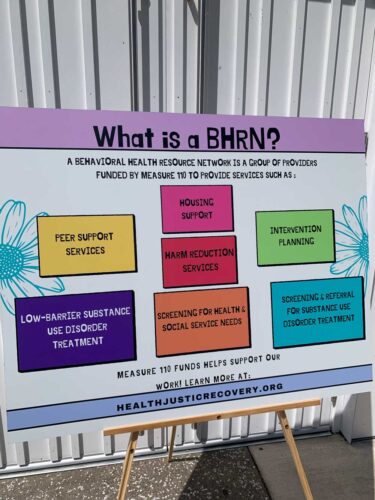
Behavioral health organizations in Lane County say they are expanding their services and helping more people despite the changes in Measure 110, the state’s embattled effort to increase mental health and addiction treatment.
Fifteen organizations recently gathered at the Farmer’s Market Pavilion to share information and show how funds provided through Measure 110 are having an impact.
“What we’ve all been able to do is really embrace this opportunity to use those resources to expand our services, to get creative about new services and to really go out and reach more people,” says Mike McCart, a research scientist at the Oregon Social Learning Center, which provides substance use and mental health treatment to adolescents and young adults.
Voters in 2020 approved Measure 110, which decriminalized noncommercial possession of drugs to more than a violation. In March, the Legislature last year recriminalized drug possession. Gov. Tina Kotek signed the bill in April.
Measure 110 also works to direct Oregon’s marijuana tax revenue to behavioral health organizations across the state.
Organizations in the Behavioral Health Resource Network (BHRN) have all received varying amounts of funding through Measure 110 that have expanded their programs. Many of them came to the May 17 BHRN Bash to show the impacts 110 has had.
Organizations in Lane County include Community Outreach through Radical Empowerment (CORE), a youth outreach program; Daisy CHAIN, a nonprofit that offers assistance to new mothers and families; and South Lane Mental Health, which provides mental health resources to those in Cottage Grove.
McCart says that the Oregon Social Learning Center has received $2 million over the last two years, providing counseling services to every high school in the 4J school district and Bethel school district. “We have more than doubled our capacity to serve teenagers who are seeking support,” he says.
Daisy CHAIN offers prenatal, birthing, postpartum and peer-support services for anyone in Lane County.
Kaylee Vandermarliere, a doula, peer-support specialist and a certified recovery mentor for the nonprofit organization Daisy CHAIN, experienced homelessness as a pregnant woman. She says Daisy CHAIN helps clients navigate challenges she once faced.
“We get connected with family and while they’re pregnant, oftentimes they are houseless living in a tent,” Vandermarliere says. “We’re able to figure out where they are and literally meet them where they are at.”
Jaclyn Mahoney, Daisy CHAIN executive director, says that money from Measure 110’s funding has allowed the organization to leverage other funding as well as provide housing and services. Daisy CHAIN received $1.2 million from Measure 110. Last fall, Daisy CHAIN rented some space in a building at 1270 Charnelton Street to provide a communal space
“We have someone to talk to, a place to change your baby’s diaper, harm reduction supplies, whatever the individual’s needs are,” Mahoney says. “We’re there because of this funding.”
Like many organizations, South Lane Mental Health in Cottage Grove waited two years before seeing Measure 110 funding. Program Manager Jon Roberts says the funding has allowed the organization to hire more people and provide clients with a “more wraparound approach,” where clients have access to most everyone on staff. South Lane Mental Health received $509,166 from Measure 110.
He says Measure 110’s main issues are the lack of public education on what the measure entails and a lack of infrastructure for it in its initial stages.
“What you get from people who are not down here doing the boots-on-the-ground work is a bit of a skewed perspective,” he says.
What Roberts and many organizers at the event say is they want politicians to give the program more time.
McCart says that he sees Measure 110 as more of a “journey.” “Maybe it’s not perfect at first,” McCort says, “but with the dedication of all the people involved, I think it will improve and we just need to give it time total to get there.”